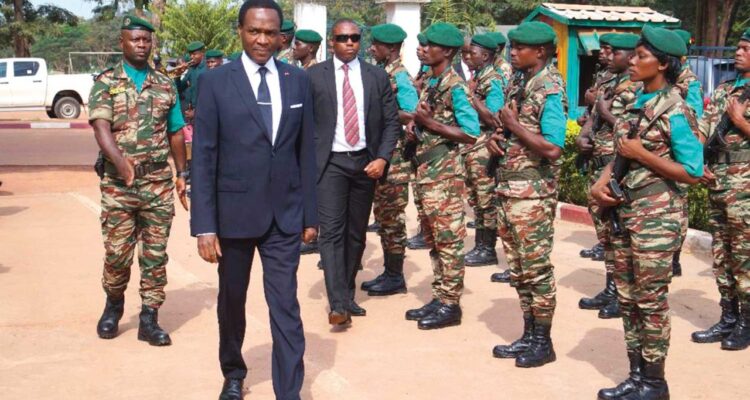After the tragic events on the 1st of October 2017 in the Anglophone regions of Cameroon, which of course could have been avoided by the Government, the Minister Delegate at the Presidency in charge of Defense (MINDEF) on Wednesday 11th October 2017 issued a communiqué announcing the holding of a meeting on October 12th 2017 at Buea, in the South-Western Region. The meeting grouped Military officers from the Ministry of Defense, Security Forces, and Governors of both the North-West and South-West Regions of Cameroon. The purpose of this conclave was to evaluate “the functioning of the Defense forces on the ground and for them to be on alert and react where necessary, in the spirit of maintaining law and order” in these regions.
In a context where, whatever security officials do, the regime’s overzealous pundits will say, the country is essentially faced with a crisis arising from political demands of the population, this communiqué emanating not from the Minister of Territorial Administration and Decentralization (MINATD) or even the Minister of Justice, but the Ministry of Defense (MINDEF) puzzles any attentive observer. Its suspicious if the Minister of Defense is concerned with “respect for the law and order” instead of administrative authorities and their support services, which are the institutions responsible for internal security in a country, all Republicans Democrats need to worry.
At the end of the in-camera meeting between the Minister of Defense and the country’s high-ranking military officials, including the heads of internal security (according to the state media report) it became apparent that Cameroon is faced with “Rebels and Terrorist movements”.
A message from the Second Joint Military Command (RMIA2), dated 12th October 2017, restricted to be circulated, curiously from a “credible source”, and widely spread on social media, talked of an imminent threat, of an attack on our country, in connection with the anglophone crisis, by former American Marines, in complicity with certain “high level personalities still on duty”, with the aim of preventing the holding of the 2018 elections.
These facts, considered together, are all the more worrying because they allow us to assess differently, the extreme militarization of the two English-speaking Regions, the disproportionate use of force and lethal weapons used on 1st October 2017 against unarmed civilian populations despite attempts by the Government to make people believe that the country is at war and that the army is faced with an enemy.
As we have noted, the President of the Republic deserted the country after his inopportune appearance in the 72nd session of the UN General Assembly in New York, whereas his country was in total crisis and uncertainty. His desertion is a disregard of the political problems and failure in the management of the crisis in the Northwest and Southwest Regions. He shall remain, however, constitutionally in office as long as the Supreme Court-Constitutional Council has not declared the vacancy of power.
However, there is an abusive and rampant militarization of the Northwest and Southwest regions, with the curious involvement of the army in the political issues, not forgetting that fierce messages that put the army on alert, not against foreign enemies operating on the national territory but against Cameroonians.
The Cameroon military cannot be in a state of war against its own unarmed population!
Article 9 of our Constitution provides that:
- “1 – The President of the Republic may, if circumstances so require, declare by a decree a state of emergency conferring special powers on him under the conditions laid down by law.
- 2 – The President of the Republic may, in the event of a serious peril threatening the integrity of the territory, life, independence or the institutions of the Republic, declare by a decree a state of emergency and take any measures he deems necessary. He shall inform the nation thereof by message.”
These legal conditions have not been met in the context of the Anglophone crisis.
Even if the country had been in a state of war, Article 34 of Presidential Decree No. 83/540 of 5 November 1983 on the organization of the Armed Forces and its Command, shall deal with duties of the Armed Force Chief of Staff (CEMA): which stipulates that in times of crisis, the Head of State can be appoint through a Presidential Decree, a General Chief of Staff of the Armed forces (CEMGA). In this case he “directly assists the President of the Republic in the exercise of his constitutional duties as Chief of the Armed Forces. The President may give him the command of military operations “. Then, in accordance with Article 8 (2.a) of Decree No. 2001/180 of 25 July 2001 on the reorganization of the territorial military command, “[i] t takes under his authority each in its specificity: the Gendarmerie forces; security Forces; fire fighters “.
Why does the Minister of Defense act as the General Chief of Staff of the Armed Forces? even though the country is not at war, to the point of bringing together central and territorial officers of the defense forces and the two governors of the North-West and South-West Regions of Cameroon, in order to evaluate “the functioning of the various ground operations, in order to maintain law and the ‘order’? Did he do it out of ignorance of the Constitution and laws of the Republic? Why does he think that we cannot worry about such an approach that also openly violates the laws and gives the impression that the situation is being taken care of by the Defense forces?
In any case, I call on the militants and sympathizers of the Cameroon Renaissance Movement (CRM) and all democratic forces to remain extremely vigilant in this context where the Anglophone crisis has revealed no consideration for a political solution and where some groups may no longer be able to express certain inclinations.
The National President
Maurice KAMTO
Yaounde, 22th October 2017
